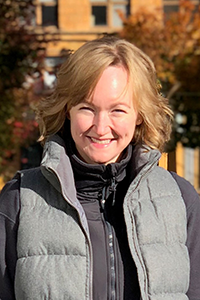
At the age of 34, Kasia Anza-Burgess, MPT’20 felt unfulfilled in her career in archaeology and sought a big change to fix her longing to help people. Read about her story on overcoming self-doubt and the unexpected connection between archaeology and physical therapy.
What drew you to pursuing a Master of Physical Therapy (MPT) degree at UBC?
I think that many of us in the healthcare field are driven by a common desire to help people. For me, I always felt the most fulfilled when I was able to contribute to the improvement of people’s lives. However, at the age of 34, I found myself frustrated by how little I was contributing towards my goal of helping people. I knew that in order to find fulfillment, I had to gamble and make a “late in life” career change. That was the point at which I decided to take some additional courses and apply for the MPT program at UBC. Although I had always wanted to be a physiotherapist, I didn’t believe that I had what it takes to get in to the highly competitive MPT program when I was younger. I chose to apply to UBC not only because of the exceptional program, but also because I believed that UBC would value both my life experience and my diverse academic background.
What is one thing that you are taking with you from your experience in the MPT program?
Go for it, whatever it is. Life is short and there is no challenge that you can’t tackle. This program taught me to dive in, try your best, don’t be afraid of hard work, make mistakes, and most importantly, learn from all of it. Before even coming into the program I had made so many excuses for myself as to why I might fail: I came from a different academic background than everyone else, I’m too old to be a student, I have too many responsibilities, etc. I learned quickly that none of these things mattered. These obstacles that I had imagined were not insurmountable and were sometimes even an advantage!
What is one piece of advice you have for students entering the MPT program?
When I was first applying to the MPT program, someone gave me a piece of advice that really stuck with me. They told me not to worry about what everyone else is doing. You will see people staying at school until all hours studying, your classmates will tell you how they didn’t sleep for days before exams, everyone will be stressed – don’t let that get to you. Trust that you are doing your best, and that you know yourself well enough to know which strategies work for you. You will make it through the program in your own way, as we all do.
Having previously studied and received a Masters in Archaeology, do you feel that there is a connection between your two degrees? Did your previous education affect your decision in pursuing your MPT?
It’s funny, whenever I tell someone that my previous degree was in archaeology it never fails to take them by surprise. To be honest, I really enjoy seeing people’s reactions! The two degrees are more connected than you might think, they just look at different aspects of us as humans. My interests in archaeology were physical anthropology and ancient DNA research. Quite a bit of my time was spent learning about human osteology and genetics. Having a strong foundation in skeletal anatomy and human biology was certainly advantageous coming in to the MPT program. My previous education did impact my decision to pursue an MPT in that I wanted to make a shift from studying people’s past to people in the present!
As you look ahead, what (or who) inspires you?
There are so many people and things to be inspired by, especially right now. I’m inspired by every person dealing with the unique challenges presented to them by the COVID-19 pandemic in the best way they can. I’m especially inspired by all the healthcare workers that are going into increasingly high risk, high stress environments every day to care for patients. On a personal level, I would be remiss not to also mention my family, most of all my wife, who are my greatest inspiration and the driving force in my life.
What do you hope will change as a result of COVID-19?
The COVID-19 pandemic has forced us all to re-examine ourselves in every sense. For me, some of the biggest eye-openers from the pandemic have been just how important healthcare and essential services are, and the disproportionate way in which vulnerable populations have been affected. What I take from this, and what I hope we can all remember going forward, is that unity is critical. Over the course of the pandemic, we have all, as members of a society, learned to work together towards a common goal more than we have ever had to before in order to protect those most vulnerable, and to prevent the healthcare system from being overloaded. I hope that this collective experience fosters a shift in our attitude toward improved collaboration and cooperation in the future.
Name one thing on your bucket list. Have you completed it?
Bucket lists are a tricky thing, I tend to find that the items on my bucket list are continually changing! That being said, getting an MPT degree/becoming a physiotherapist has been a dream of mine for a long, long time. One that I previously didn’t think I’d ever be capable of achieving. If anything, I think what I have ticked off my bucket list is “find the confidence to try something (seemingly) impossible.”
Comments are closed, but trackbacks and pingbacks are open.